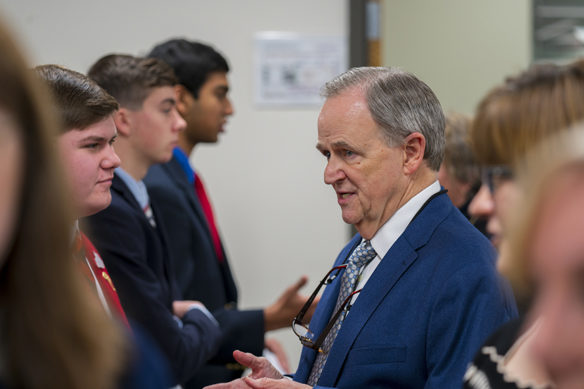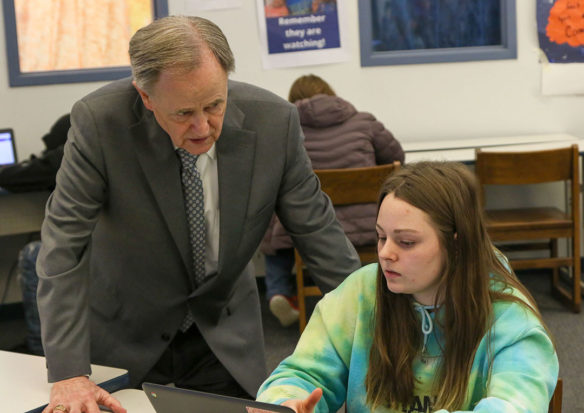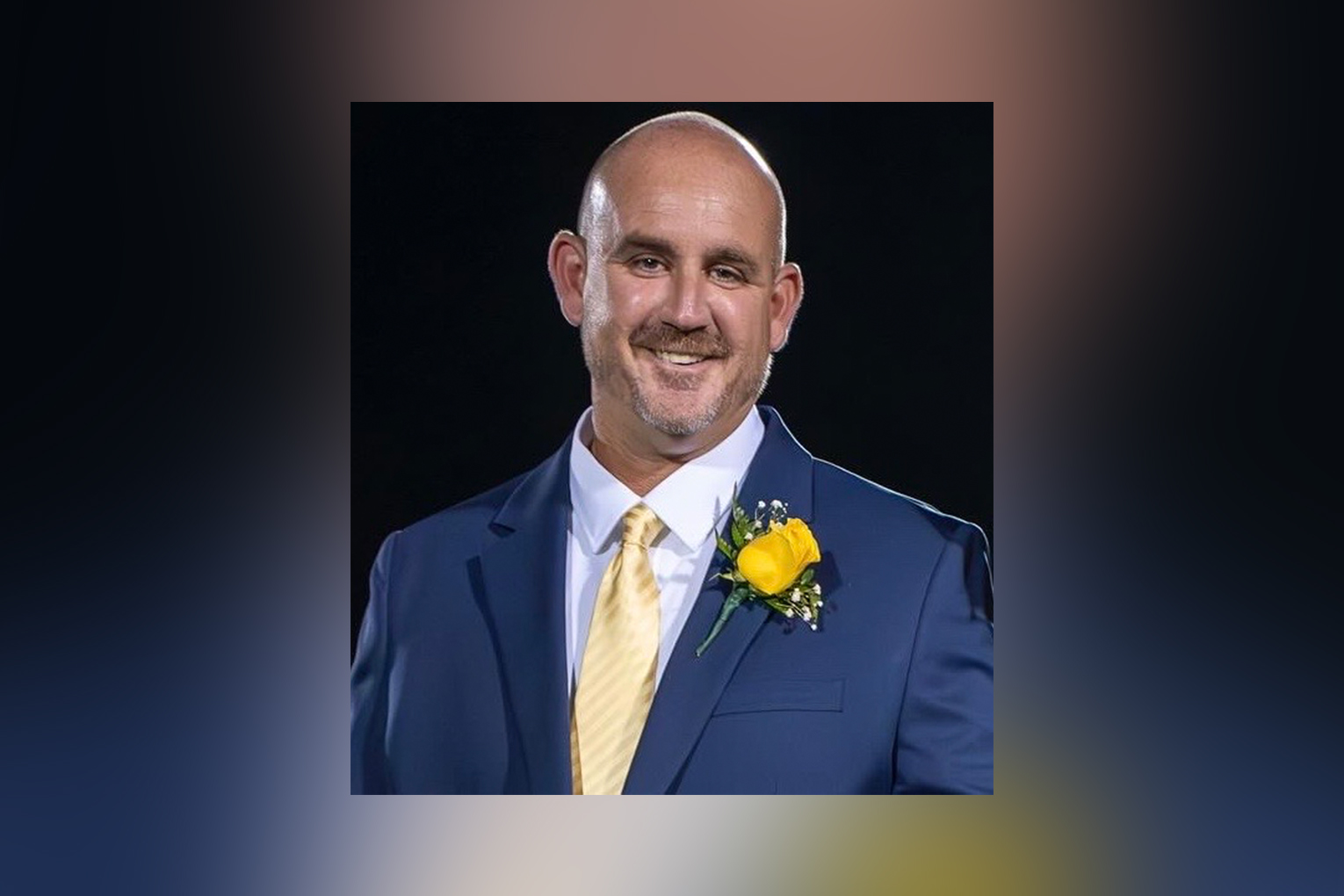
Lee Todd, a member of the Kentucky Board of Education, talks with representatives of career and technical student organizations who were recognized at a KBE meeting in Frankfort. Todd said he hopes the board can assist educators in helping students realize the possibilities that are available to them beyond what they can see.
Photo by Marvin Young, Feb. 4, 2020
- Todd said one of his priorities on the Kentucky Board of Education will be helping schools and districts find ways to spend their money wisely.
- Todd has long been involved with programs that have worked to improve K-12 science and mathematics instruction in Kentucky and beyond.
By Mike Marsee
mike.marsee@education.ky.gov
Growing up in Earlington, Lee Todd first thought he might want to be a TV repairman because he wrapped the newspapers he delivered in the warmth of the local TV repair shop in the winter.
When he went to high school, he developed a respect for his mathematics and science teacher, so he thought he might want to do that.
Those were the things Todd knew within his small world. As he began to see the world beyond the boundaries of his small Hopkins County town, however, his aspirations changed several times.
When he settled in as a student at Murray State University, he thought he might want to be a college instructor. When he saw research in action while at the University of Kentucky, he thought he might want to be a research professor. And when he moved on to Massachusetts Institute of Technology and obtained six patents for his work in the area of large-screen projection displays, he thought he might become an entrepreneur.
Now, as a member of the Kentucky Board of Education, Todd would like to help Kentucky’s schools encourage students to “dream linearly” and to understand that a world of possibilities is available to them.
“I dreamed of being a TV repairman because I couldn’t dream big enough,” Todd said. “I try to tell teachers and students that we have to get the students in Kentucky to dream faster, to understand what they can do beyond what they see.”
Todd achieved some of his linear dreams. After earning a bachelor’s degree in electrical engineering from UK and a master’s and a doctorate in electrical engineering from MIT, he taught in the college classroom for nine years and founded two technology companies based on his research in part to prove that Kentucky could create high-tech jobs that would encourage some of its brightest minds to stay in the state.
“I would have been as a high school teacher, I think, teaching math and physics. I would have been happy as a university professor. I love teaching, but I felt a real calling … that somebody needed to show that we could do high tech in Kentucky,” he said.
Of course, Todd is perhaps best known in Kentucky for his 10 years as president of UK from 2001 to 2011, during which he led the school through a period of significant increases in enrollment, budget resources, research funding, medical facilities and start-up company initiatives.
“It was a job I never ever thought I’d have,” he said. “I was nominated, but I didn’t apply for three months. I couldn’t envision being president of UK – it’s like being the head of Harvard or something if you’re a Kentuckian – but I finally threw my hat in the ring and felt that that could be the best job in the state to change the state.”
Todd hopes to affect positive change for Kentucky’s schools during his time with KBE. He said one of his priorities will be helping schools and districts find ways to spend their money wisely, and he said he prefers using “an engineering approach” to do so.
“Money is tight, and there is a lack of will power to bring in new money, so it’s very important to spend the money you have wisely as well as possible,” he said. “I believe in making those decisions based on data.
“One thing I’d like to bring to this board is to look at what’s working in some of the areas around the state, figure out why it’s working there, and if it’s really working there and has for a period of time, why don’t we fund more of that rather than inventing new things that take a while to prove and take money away from what we should be doing?”

Kentucky Board of Education member Lee Todd talks with Sierra Cox, a freshman at Frankfort High School (Frankfort Independent) during a visit to the school. Todd has long been involved with programs that have worked to improve K-12 science and mathematics instruction in Kentucky and beyond.
Photo by Jacob Perkins, Feb. 25, 2020
Todd also is a booster of hands-on learning and he recalled what it meant to him to learn while working with a sample kit that was given to him at the end of his junior year by Bill Fulkerson, who taught math and science courses at now-closed Earlington High School (Earlington Independent).
“It had a book about how to make an inductor and a capacitor and how to connect them to a solar cell and a speaker to turn light into sound,” he said. “I did that on our kitchen table and it just thrilled me to death to see things in a book come together to make something work. That’s what really got me interested in math and science. I’ve been a proponent of hands-on education for quite a while.”
Todd is best known for his work in higher education, but he has also long been involved with programs that have worked to improve K-12 science and mathematics instruction in Kentucky and beyond.
In 1987, he co-founded the Kentucky Science and Technology Council (KSTC), and out of that came Advance Kentucky, which works with districts to increase enrollment and success in STEM classrooms.
“I think that has measurably improved the Advance Placement pass rates in the state,” he said.
In 1998, he and Thomas Boysen, who had previously been Kentucky’s first commissioner of education, obtained a $10 million grant from the National Science Foundation to develop the Partnership for Reform Initiatives in Science and Mathematics (PRISM) between the Department of Education and KSTC, which addressed specific needs and barriers hindering the restructuring of science and math education in the state.
“We were trying to change the way we teach math and science to improve that area because it’s so vital,” he said.
Todd has served on the Prichard Committee for Academic Excellence, the Partnership for Education Reform and as chairman of the technology committee of then-Lt. Gov. Steve Beshear’s Kentucky Tomorrow Commission.
Todd has come a long way from his early days in Hopkins County, where he learned to shoot pool in the pool hall owned by the TV repairman next door, where he became fascinated by the Russian Sputnik satellites that orbited the earth in the late 1950s – and where he fondly recalls the dedication of the teachers in his small school.
“I’ve always been a proponent for public school education,” he said.
His terms expires April 14, 2022.




Leave A Comment